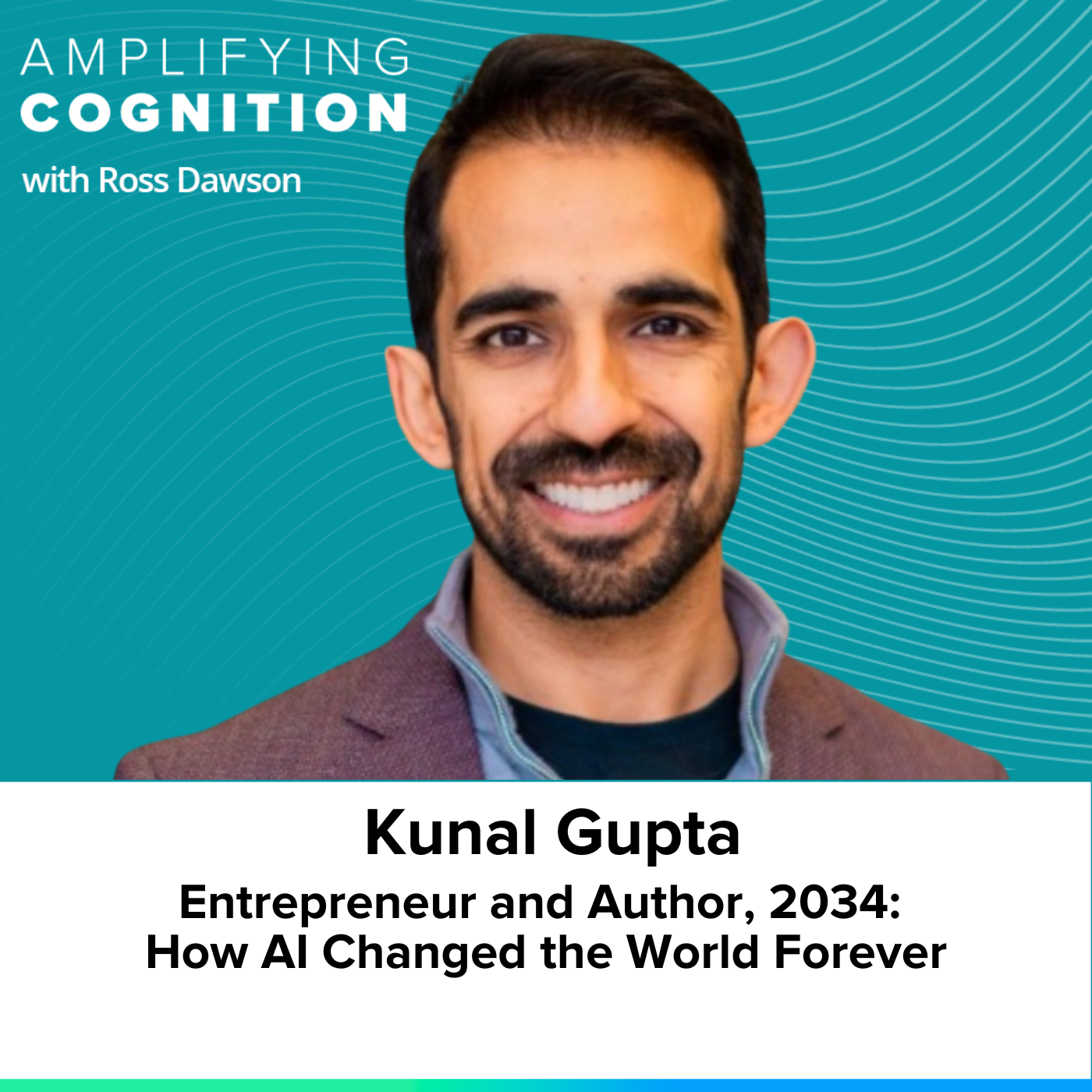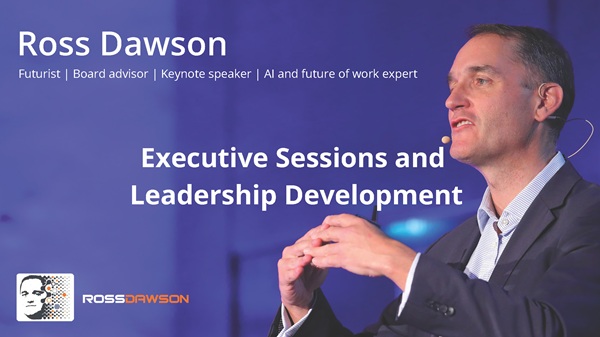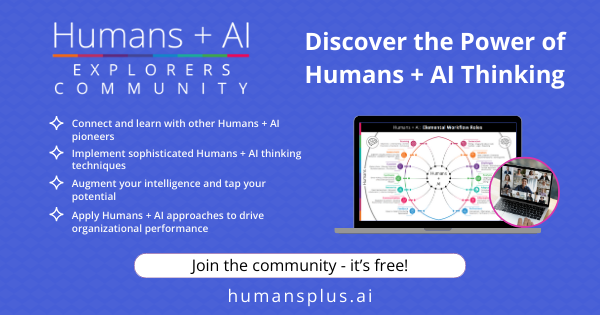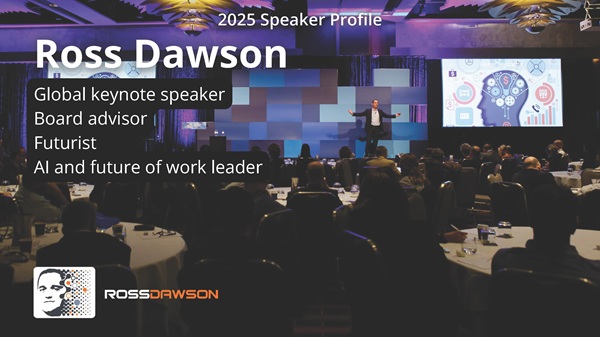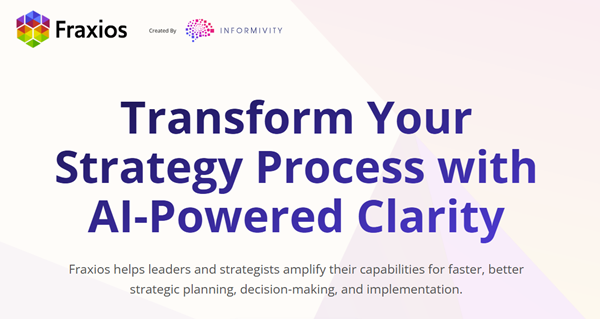“Maybe the goal isn’t to eliminate the task or the human—but to reduce the frustration, the cognitive load, the overhead. That’s where AI shines.”
– Kunal Gupta

About Kunal Gupta
Kunal Gupta is an entrepreneur, investor, and author. He founded and scaled global digital advertising AI company Nova as Chief Everything Officer for 15 years, with teams and clients across 30+ countries. He is author of four books, most recently 2034: How AI Changed the World Forever.
What you will learn
-
Hosting secret AI dinners to spark human insight
-
Using personal data to take control of health
-
Why cognitive load is the real bottleneck
-
When AI becomes a verb, not just a tool
-
Reducing frustration through everyday AI
-
The widening gap between AI capabilities and adoption
-
Empowering curiosity in an AI-shaped world
Episode Resources
Transcript
Ross Dawson: Kunal, it is awesome to have you on the show.
Kunal Gupta: Thanks, Ross. Nice to see you.
Ross: So you came out with a book called 2034: How AI Changed Humanity Forever. So love to hear the backstory. Yes, that’s the book. So what’s the backstory? How did this book come about?
Kunal: Yeah, I’ve written a few books, but this is definitely the most fun to write and to read and reread, and at some points, to rewrite.
So back in November 2022, ChatGPT launches. There’s this view—okay, this is going to change our world, not sure how. So in the ensuing months, I had a number of conversations with friends and colleagues asking, “Hey, like, how does this change everything?” I asked people very open-ended questions, and the responses were all over the place.
To me, what I realized was we actually just don’t know, and that’s the best place to be—when we don’t know but are curious.
So I started to host dinners, six to ten people at a time in my apartment. I was in Portugal at the time, and London as well. Over the course of 2023, I hosted over 250 people over a couple dozen dinners.
The setup was really unique in that nobody knew who else was coming. Nobody was allowed to talk about work, nobody was allowed to share what they did, and no phones were allowed either. So that meant really everybody was present. They didn’t need to be anybody, they didn’t need to be anywhere, and they could really open up.
All of the conversations were recorded. All the questions were very open-ended along the lines of—really the subtitle of the book—like, how does AI change humanity? And we got into all sorts of different places.
So over the course of the dinners in the year, recorded everything, had to transcribe it, and working with an editor, we manually went through the transcripts and identified about 100 individual ideas that came out of a human. And it’s usually some idea, inspiration, or some fear or insecurity.
And we turned that into a book which has 100 different ideas, ten years into the future, of how AI might take how we live, how we work, how we date, how we eat, how we walk, how we learn, how we earn—and absolutely everything about humanity.
Ross: So, I mean, there’s obviously far more in the book than we can cover in a short podcast, but what are some of the high-level perspectives? It’s been a bit of time since it’s come out, and people have had a chance to read it and give feedback, and you’ve reflected further on it.
So what are some of the emergent thinking from you since the book has come out?
Kunal: Yeah, I probably hear from a reader or two daily now, sharing lots of feedback. But the most common feedback I hear is that the book has helped change the way they think about AI, and that it’s helped them just think more openly about it and more openly about the possibilities.
And that’s where introducing over 100 ideas across different aspects of society and humanity and industries and age groups and demographics is really meant to help open up the mind.
I think in the face of AI, a lot of parts of society were closed or resistant to its potential impacts, or even fearful. And the book is really designed to open up the mind and drop some of the fear and really to be curious about what might happen.
Ross: So taking this—taking sort of my perennial “humans plus AI” frame—what are some of the things that come to mind for you in terms of the potential of humans plus AI? What springs to mind first?
Kunal: Those that say yes and are open and curious about it—I really think it’s an accelerant in so many different parts of life.
I’ll give an example of AI being used in government. I gave the fictitious example of Tokyo electing the first AI mayor, and how that went and what the implications of that were. I gave examples in Europe of AI being used to reduce bureaucracy and streamline all the processes.
Government is an example of something that touches all of our lives in a very impactful way, and AI being used to help make better decisions—more objective decisions, decisions that aren’t tied to ego or a four-year cycle—I think could lead to better outcomes for the aggregate of any given society or country or city.
That’s one example.
Education is another clear example, in terms of how young people learn, but then also how old people learn. There are a couple of ideas around AI—this idea of AI literacy for not just young people, but also old people—and some interesting ways that comes to life.
So those are a few examples covering a spectrum of how AI and humans can come together.
Ross: So coming back to present and now and here. So what, in what ways are you using AI to amplify what you’re doing? Or where is your curiosity taking you?
Kunal: Absolutely everything. And my fiancée gets annoyed that I’m talking some days to ChatGPT more than I am to her. And we live together.
We call ChatGPT my friend, because it gets embarrassing to just say ChatGPT so much within a single day. So, “as I was talking to my friend,” “I was asking my friend,” etc.
There’s a few areas of my life that I’m very focused on these days. I’d say health is a big one, and optimizing my health, understanding my health, testing. So making sense of kind of my health data beyond the basic blood tests. I’ve done lots of longevity-based testing and take lots of supplements. So going deeper and geeking out on that has been a lot of fun.
Ross: So just digging into that. So do you collect data which you then analyze, or is this text-based, or is this using data to be able to feed into the systems?
Kunal: So my interest on health started probably four years ago. Had some minor health issues that triggered me to start to do a bunch of testing.
And then, being a tech guy, I got fascinated by the data that I was starting to collect in my body. So it happened, but four years of very consistent blood work, gut health, sleep data, with all the fitness and sleep trackers, smart scale, and lots, lots more.
So I’d say that’s one part—is I have a couple years’ worth of data. I think the second part that I found interesting, because I’ve had a lot of data, is to use my own data as the baseline versus some population average, which is a different gene pool and a different geographic location.
So seeing just the changes in my data over time, and then using reference ranges as one comparison point has been helpful.
And then, I see lots of specialists for different health issues that I’ve dealt with over the years. And I have found AI, prompted the right way with the right data, as effective, if not more effective, than the human specialists.
So I do walk into my specialist appointments now with a bunch of printouts, and I essentially fact what they tell me oftentimes in real time with ChatGPT and other AI tools. And that gives me just a lot more confidence in things I’m putting into my body, and things I’m doing to my body.
Ross: How do the doctors respond to that?
Kunal: I’m definitely unique in that sense—at least the specialists I see, they’re not used to it. I would say probably like three to five doctors lean in and ask me how did I collect it, and want copies of the printouts.
And two out of five are a little dismissive. And that’s not surprising, I guess.
Ross: There’s just this recent data showing—comparing the patient-perceived outcomes from doctors—where basically they perceive the quality of the advice from the AI to be a little bit better than the doctors, and the empathy way, way better than doctors.
Kunal: Yeah, yeah, I trust in my experience as well.
Ross: So, but now you’re uploading spreadsheets to the LLMs or other raw data?
Kunal: Spreadsheets and PDF reports. And that’s the annoying part, actually.
I’ve done a couple dozen different tests on different parts of my body and get reports in all these different formats. It’s all in PDFs from all these providers, and they give their own explanations using their own reference data. So it’s hard to make sense of it.
And I live between Australia and Portugal, so even a blood test in Europe versus blood tests in Australia—different metrics, different measurement systems, different reference ranges. So AI has helped me normalize the different formats of data.
Ross: Yeah, but of course, you have to have that antenna into putting it in and asking it to normalize, and then be able to get your baseline out of that.
Kunal: So I’d say it’s just like this theme is—for the listeners or viewers—it’s just feeling empowered. And health is a very sensitive topic, one that oftentimes, when we have issues, we feel helpless for them. And the support to help has helped me feel more empowered and more motivated, frankly, to improve my health.
Ross: Yeah, well, I mean, just as a tiny, tiny example—my father went into some tests a little while ago, and we got back the report. It was going to be interpreted by the specialist when he went to visit them a week or two later.
So I was actually able to get some kind of sense of what this cryptic report meant before waiting to find out the specialist’s interpret for us.
Kunal: Yeah, there’s so much anxiety that could exist in waiting, and the unknown. So even if the known is good or bad, just the known is helpful versus the unknown.
Ross: So in terms of cognition, or thinking, or creating, or ideation—or, I suppose, a lot of the essence of what you do as an entrepreneur and thinker and author—so what… So let’s get tactical here.
What are some of the lessons learned, and tools you use, or how you use them, or approaches which you’ve found particularly useful?
Kunal: I’ll give a very simple example that hopefully is relatable for many people. But it’s figured a much deeper reflection for me—realizing I need to think differently. And as an adult, it’s harder to change the way we think.
So for my partner’s father, who turned 70 earlier this year, we threw and hosted a big party on a boat in the Sydney Harbor.
And three days before the party, I went to my partner. I was like, “We should have a photo booth on the boat.” And she dismissed it, saying, like, “This is three days. We don’t have time. There’s already too much work to do for the party.” She was feeling stressed.
And the creative and entrepreneur in me—I heard it, but I didn’t listen to it.
So then I went to GPT and I said, “Is it actually allowed to have a photo booth on a boat?” And it’s like, “Yes.”
“Okay, can I get a photo booth vendor in three days, in Sydney?” And the answer was yes.
I’m like, “Okay, who are 10 photo booth vendors in Sydney?” And it gave me 10 vendors.
And then I was about to click into the first website, and then I just had this reaction. I was like, “This is too much work.”
So then I said, “How can I contact all of these vendors?” And it gave me their phone numbers and email addresses.
Then I was about to click the email address—and again, I was like, “Still too much work.” I was feeling quite impatient.
So then I paused for a minute, and then I said, “Give me the email addresses, separated by commas.”
And then I opened up Gmail, put the email addresses in BCC, and wrote up just a three-line email saying, “This is the date, this is the location, need a photo booth. Give me a proposal.”
Within three hours, I had four proposals back, showed them to my partner, she picked one that she liked, and it was done.
So the old way of doing that would have taken so many phone calls and missed calls and conversations and just a noise and headache. And this new way literally took probably less than seven minutes of my time, and we got to a solution.
So that’s an example. To abstract it out now—there’s so many perceived barriers to the old way of doing things. And I think in simple daily life tasks, I’m still learning and challenging myself to just think differently of how to approach it.
Ross: So, what you describe is obviously what many people say is the image for agentic AI. You should have an agent where you can just say to them exactly—give them the brief—and it will be able to go and do everything which you described.
But at the same time, speaking in early April 2025, agents are still not quite there—as in, we don’t have any agent right now which could do precisely what you’ve said.
So where do you see that pathway in terms of agents being able to do these kinds of tasks? And how is it we use them? Where does that lead us?
Kunal: This is such an interesting moment because we don’t know that fun part.
So we may end up with browser agents—agents that go, open up a browser, click in the browser, and use it on the user’s behalf. And that might be with like 70% accuracy, and then 80%, and then 90%, and then it gets to “good enough” to schedule and manage things.
We might end up with agents that make phone calls—and there’s lots of demos flying around the internet—that make bookings and coordinate details and appointments on our behalf.
Or it may be just a little simpler than that, which may be more realistic—kind of like the photo booth example I gave—which is an agent to just help us think through how to get the task done. And maybe it’s not eliminating the task, but reducing the task.
And I think we have a role to play there, as the human user, and the AI has a role to play. Understanding how to get the best of both versus the worst of both.
The worst of both is impatience on the human and then incompetence on the AI—and then throwing the whole thing out.
I do think there’s a world where it’s the best of both. And probably reframing the goal, which is not to eliminate the human, it’s not to eliminate the task for the human, but to reduce the frustration, reduce the cognitive load, reduce the overhead—the time it takes to get something done.
And software development—we can get into it, if you’d like—is, I think, an example where that’s starting to show itself. It’s not eliminating the human, but it’s reducing the cognitive load and the time and the headache involved.
Ross: So this goes—it’s a very, very big question, very big and broad question—but this idea of reducing cognitive load, freeing up time so that, you know, the various ways we can put that is that it allows us to move to higher-order, more complex tasks and thinking and creativity, or to give us time to do other things.
And I think there may be other frames around what that does, but if we are freeing up cognitive load, what do you see as the opportunities from that space?
Kunal: Yeah, I see cognitive load as the critical path right now.
I mean, there’s so many ideas to explore and technologies to try, but there’s a cognitive load to learn it. And I think we have a while to go where we won’t find interesting, creative, or productive uses for our excess cognitive load—probably at least another…
We won’t—there won’t be an excess because, even as AI frees us up, there’s going to be more. There’s still such a big backlog of things we’re interested in, curious in, that we want to apply our cognitive load to—whether it’s productive in an economic sense, or productive in a health sense, or productive in a friendship sense, or productive in a learning sense.
So maybe that’s the way to frame it—is that it’ll become multidimensional. It won’t be purely an economic motivation of work. And there may be other motivations that we have, but are often suppressed or not expressed, because the economic one takes place of this.
Ross: Yeah, no. I mean, that goes, I think, to what is one of the greatest fallacies in this—people predicting future techno-unemployment—is that there’s a fixed amount of work. And if we take away work by machines, then there’s not gonna be much left to do with humans.
Well, there’s always more to do, and there’s more to create and spend our time. So there’s no fixed amount of work or ideation or thinking or whatever.
But I think I like this idea that we are—humans are—curious. We are inventors, we are thinkers, and we are… I think this curiosity is a—if AI can help us or guide us or support us in being more curious because we are able to, amongst other things, learn things quickly, which would have previously required taking a degree, or whatever it may be—then that is a massive bonus for humanity.
Kunal: Yeah, yeah, completely.
I am curious—your take. Something I am worried about is if that curiosity becomes of a passive nature versus active.
Passive meaning Netflix and Instagram and TikTok, with the consumption on these more passive platforms growing. And we saw that in the pandemic. We had a bunch of people who were not working, maybe getting some small paychecks from the government, and the response on aggregate was to consume versus create.
And so I do worry—is what if the curiosity just turns into more scrolling and browsing, versus something that’s that, you know.
Ross: This goes to my last chapter of Thriving on Overlord, where I essentially talk about cognitive evolution—essentially saying we’re getting this… it’s evolution or devolution, in the sense of the most default path for our brain is to just continue to get easy stimulus.
And so, essentially, there are plenty of people who start spending all their day scrolling on TikTok, or whatever equivalent they have. Whereas, obviously, there are some who say, “Well, all of this information abundance means that I can do whatever I want, and I will go and explore and learn and be more than I ever could be before.”
And so you get this divergence.
I think there’s a very, very similar path here with AI, where there are people using AI as the… A lot of recent research is pointing to reduced cognitive functioning because we are offloading.
And I often say, the greatest risk with AI is overreliance—where we just sort of say, “Oh, that’s good enough. I don’t need to do anything anymore.” And I think that’s a very real thing.
And of course, many other people are using these as tools to augment themselves, achieve far more, be more productive, learn faster.
But I think one of the differences between the simple information space in which we’ve been living and the AI space we’re now living in is that AI is interactive. We can ask the questions back.
TikTok or TV screen and so on—you, well, you can create your TikTok. Sure, that’s great if you do that. But the AI is inherently interactive.
It doesn’t mean that we use it in a useful way. I mean, the recent Anthropic economic index picked out “directive” as one of what it called “automation,” where it says, “Do this,” and so it’s just doing that—as opposed to a whole array of other ones, which are more around learning, or iterating, and having conversations, and so on, which are more the augmenting style.
And there is still this balance, where quite a few are just getting AI to do things. But now we have far more opportunity than with the old tools to be participatory.
Kunal: Yeah. I, yesterday, was using an AI web app, and I got stuck, and I had my first AI voice agent customer support call.
So I just hit “Call,” was immediately connected—no wait time. And then I described my problem, and it guided me through a few steps.
And then I wasn’t able to resolve it—which I assumed was going to be the case—but at the end, it gave me the email address for the startup behind the product, where I couldn’t find the email address anywhere on the website. They probably do that on purpose.
But it was probably like a two-minute interaction, and it was a very pleasant, friendly, instant conversation. And I didn’t mind it.
After that, I noticed—okay, this is the future. My customer service requests and support requests are going to be with AI and voice agents, and they’ll be instant, and the barriers will come down.
Some will be less shy to ask for help. Where today, the idea of calling for customer support feels so daunting, this actually felt quite effortless.
Fine. It’ll become more interactive.
Ross: Yeah. Well, it is effort to type, and whatever the format people prefer—whether it’s typing or speaking or having a video person to interact with—I mean, these are all ways where we can get through problems or get to resolution faster and faster.
And I think this idea of the personalized tutor—I mean, I’ve always, since way before generative AI, always believed that potentially the single biggest opportunity from AI was personalized education. Because we are all different. We all learn differently, we all have different interests, and we all get stuck.
In classrooms—those who go to school—it’s the same for everyone, with, if you’re lucky, a fraction of a teacher’s time for personalized interaction.
So that’s this—again, that takes the willingness and the desire to learn. But now we have access to what will be, very soon, some of the best, nicest, most interactive tutoring—well, not human.
And I think that is critically different. But that requires simply, then, just the desire.
Kunal: Yeah, I mean, on the desire—I’m curious for your take on this.
I’ve noticed the capabilities of AI are growing at a very fast rate, and it feels like it’s at a faster rate than the adoption of AI. So, like, the capabilities are growing at a faster rate than the adoption of the capabilities. And the gap is getting bigger.
I was part of the smartphone revolution—2007, 2008—and built my business at that moment. And that was an example where the capabilities were higher than the adoption, but we quickly caught up.
And then social media—same thing. Capabilities were ahead of the consumer, but the consumer caught up. Cloud computing—same again. Capabilities grew, and then enterprises caught up pretty fast.
So in previous tech waves, in my lifetime at least, there’s been an initial gap between capabilities and adoption, but it’s narrowed.
And here, this feels like the opposite. It feels like the reverse—where the capabilities and the adoption, the gap is getting bigger.
And I’m curious if you agree with that. And, I guess more importantly, what are the implications of that? And, I guess, opportunities.
Ross: Well, what I think is there’s always been this spectrum of uptake—from internet through to every other technology—and sort of how the early adopter through to the laggards.
And now that is becoming far more accentuated, in that there are plenty of people who have never tried an AI tool at all, and there’s plenty of people that spend their days, like you, interacting with the systems and learning how to use it better.
And this is an amplifier, as in, those who are on the edge are more able to learn more and be able to keep closer to the edge. And those who are not involved are legally getting more behind.
And this is one of the very concerning potentials for augmenting divides that we have in society—between wealth and income and access to opportunity.
So I think it is real. I think that it’s… it is the nature of it, as it starts to increase over time itself.
Kunal: Yeah, yeah. In the book, I talk about AI—this moment when AI goes from being a noun to a verb.
And, like, we’ve learned to speak, to walk, to write, to read, and then to AI—introducing this idea of AI literacy.
And it boggles my mind that in a lot of parts of the world, schools are banning AI for kids. And that horrifies me, knowing that this is going to be as important as reading and writing.
Ross: Yeah, no, I think that’s absolutely true.
So in our recent episode with Nisha Talaga, she runs basically AI literacy programs across schools around the world, and she’s doing some extraordinary work there.
And it’s really inspiring—and doing obviously a very good job at bringing those principles.
But yeah, I think that’s really true, and I think that’s a great sort of conclusion, and bringing that journey from the book and what we’ve looked at—and, I suppose, these next steps of how it is we use these tools, as you say, as a verb, not a noun.
So where can people go to find out more about your work?
Kunal: Yeah. So it’s my book 2034, and my other books—find them all on Amazon, Audible, free on Spotify, like the AI-narrated version of my voice reading them to you.
And then my website, kunalgupta.live, and I have an AI newsletter called pivot5.ai—the number five—and that’s a daily newsletter that goes to a few hundred thousand people and kind of top-line summarized for a business leadership audience.
Ross: Awesome. Thanks so much. Really appreciate your time, your insights.
Kunal: Thank you.
Podcast: Play in new window | Download

